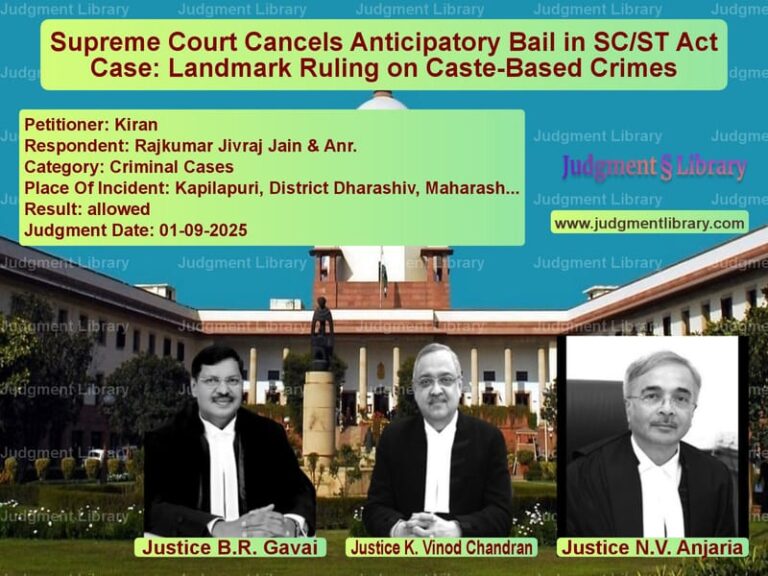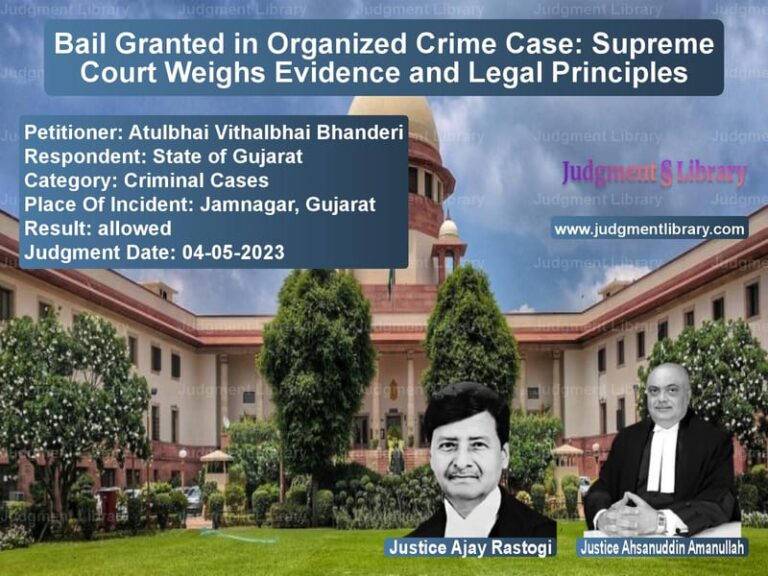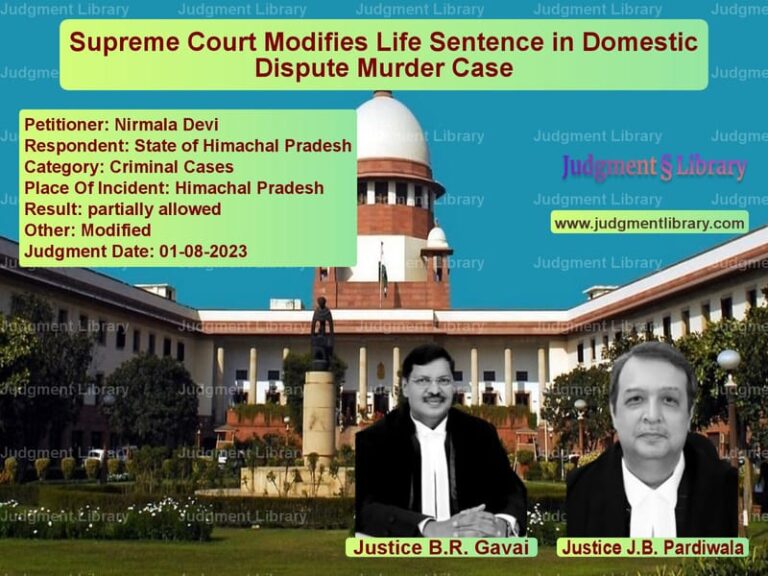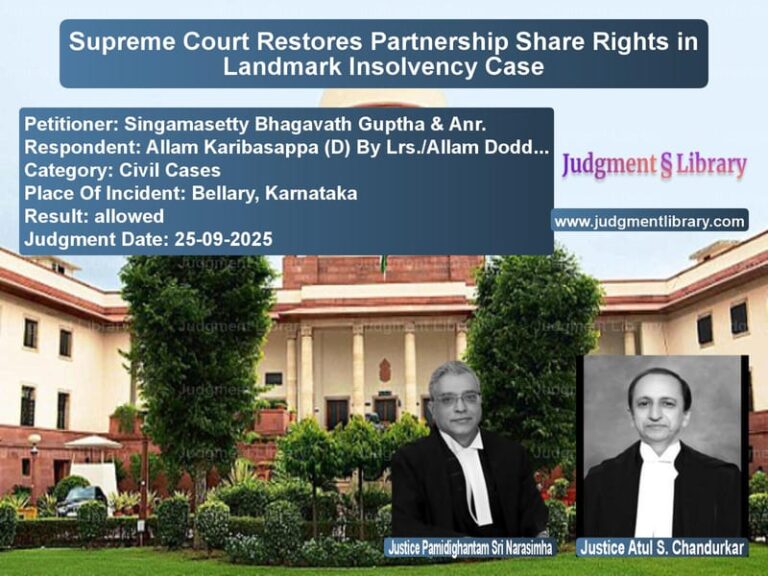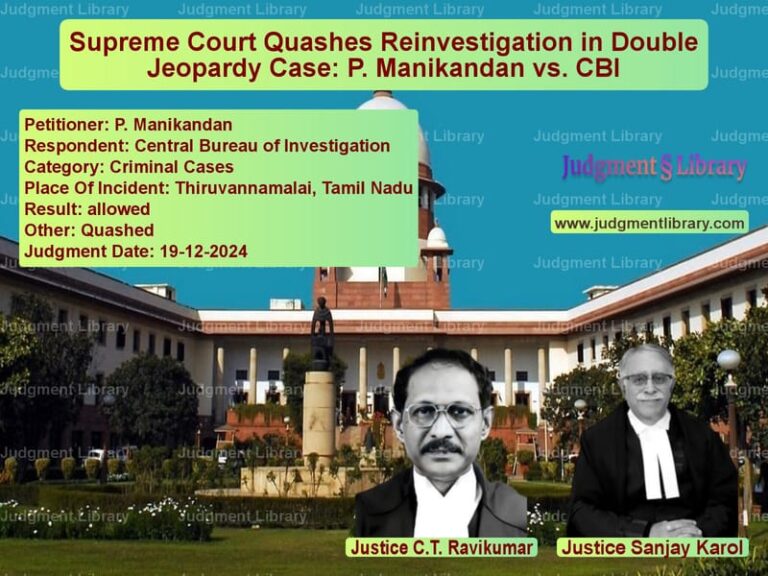Stamp Duty on Agreement to Sell: Supreme Court’s Landmark Judgment Explained
The Supreme Court of India, in its latest judgment in the case of Ramesh Mishrimal Jain vs. Avinash Vishwanath Patne & Anr., has clarified the legal stance on whether an agreement to sell can be deemed a conveyance under the Bombay Stamp Act, 1958, thereby attracting stamp duty. This case brings into focus crucial aspects of real estate transactions, stamp duty liabilities, and legal interpretations of agreements to sell.
The appeal was filed by Ramesh Mishrimal Jain against the order of the Bombay High Court, which upheld the trial court’s decision to impound an agreement to sell dated 03.09.2003 and directed it to be sent to the Registrar of Stamps for recovery of deficit stamp duty and penalty. The appellant challenged this order, contending that stamp duty was not payable since possession was not transferred under the agreement. However, the respondents argued that possession was retained and deemed transferred, thereby making the agreement a ‘conveyance’ under Explanation I to Article 25 of the Bombay Stamp Act.
Background of the Case
The dispute arose from an agreement to sell executed on 03.09.2003 between the appellant and the mother of the respondent. The property in question, located in Paiki Village, Khed, comprised House No. 78/B/8 and an adjoining room. The agreement was executed on a stamp paper worth Rs. 50, whereas, as per the authorities, a stamp duty of Rs. 44,000 was required. Additionally, a penalty of Rs. 1,31,850 was imposed.
The trial court found that the agreement to sell amounted to a deemed conveyance since possession remained with the appellant and impounded the document for stamp duty assessment. The High Court, in its 2019 ruling, upheld the trial court’s decision, leading to this appeal before the Supreme Court.
Arguments Presented
Petitioner’s Arguments
The learned counsel for the appellant, challenging the High Court’s ruling, argued:
- Explanation I to Article 25 applies only if possession is immediately transferred or agreed to be transferred as part of the agreement to sell.
- In this case, the agreement explicitly stated that possession would be transferred only after the execution of the sale deed, meaning the agreement did not qualify as a conveyance.
- The appellant’s possession was in the capacity of a tenant and not as an owner, and hence, the agreement should not be treated as a deemed conveyance.
- The courts erred in treating the agreement as a conveyance, leading to an undue imposition of stamp duty and penalty.
- The agreement was merely an intention to sell, and no actual transfer took place at the time of execution.
Respondent’s Arguments
The respondents countered the arguments, stating:
- The property was jointly owned by Respondent No.1 and his mother. Upon her demise, Respondent No.1 became the absolute owner.
- The agreement was executed for Rs. 11,00,000, with Rs. 1,00,000 paid in advance. The agreement stipulated that possession would be transferred within 11 months.
- Under Article 25 of Schedule I of the Bombay Stamp Act, an agreement to sell is a deemed conveyance if possession is transferred at any stage, including before or after execution.
- Since the appellant remained in possession, the agreement was rightly impounded, and stamp duty was payable.
- The legal principle that stamp duty is on the instrument and not the transaction was upheld by the courts.
Supreme Court’s Observations
The Court analyzed the legal position and examined previous rulings on the issue, referring to key precedents:
- In Veena Hasmukh Jain vs. State of Maharashtra, the Court had held that if possession is transferred under an agreement to sell, the document is deemed a conveyance.
- Similarly, in Shyamsundar Radheshyam Agrawal vs. Pushpabai Nilkanth Patil, the Court reiterated that even symbolic possession under an agreement to sell attracts stamp duty.
Key Judicial Observations
The Court, after careful deliberation, made the following observations:
- “Stamp duty is levied on the instrument, not on the transaction. The existence of a transaction is irrelevant if the instrument itself meets the conditions under the Stamp Act.”
- “If possession remains with the buyer under an agreement to sell, even if initially held in another capacity, the agreement is deemed a conveyance.”
- “The legislature, by enacting Explanation I to Article 25, intended to prevent revenue leakage by ensuring that agreements transferring possession pay the requisite stamp duty.”
- “The agreement in question explicitly mentioned that possession was with the appellant in the capacity of a tenant. However, the subsequent agreement extended possession, establishing a clear intention to transfer ownership later.”
Final Ruling and Conclusion
The Supreme Court upheld the impugned order, dismissing the appeal. The Court ruled:
- The agreement to sell, by its nature, indicated possession retention by the appellant, making it a deemed conveyance under Article 25.
- The appellant is liable to pay stamp duty and penalty as assessed by the Registrar of Stamps.
- The document must be impounded until the required stamp duty is paid.
This judgment reinforces the importance of ensuring compliance with stamp duty laws and clarifies the legal position regarding agreements to sell. Property buyers and sellers must carefully draft agreements, considering stamp duty implications to avoid disputes and penalties.
Petitioner Name: Ramesh Mishrimal Jain.Respondent Name: Avinash Vishwanath Patne & Anr..Judgment By: Justice J.B. Pardiwala, Justice R. Mahadevan.Place Of Incident: Paiki Village, Khed, Ratnagiri.Judgment Date: 14-02-2025.
Don’t miss out on the full details! Download the complete judgment in PDF format below and gain valuable insights instantly!
Download Judgment: ramesh-mishrimal-jai-vs-avinash-vishwanath-p-supreme-court-of-india-judgment-dated-14-02-2025.pdf
Directly Download Judgment: Directly download this Judgment
See all petitions in Contract Disputes
See all petitions in Property Disputes
See all petitions in Specific Performance
See all petitions in Damages and Compensation
See all petitions in Judgment by J.B. Pardiwala
See all petitions in Judgment by R. Mahadevan
See all petitions in dismissed
See all petitions in supreme court of India judgments February 2025
See all petitions in 2025 judgments
See all posts in Civil Cases Category
See all allowed petitions in Civil Cases Category
See all Dismissed petitions in Civil Cases Category
See all partially allowed petitions in Civil Cases Category


